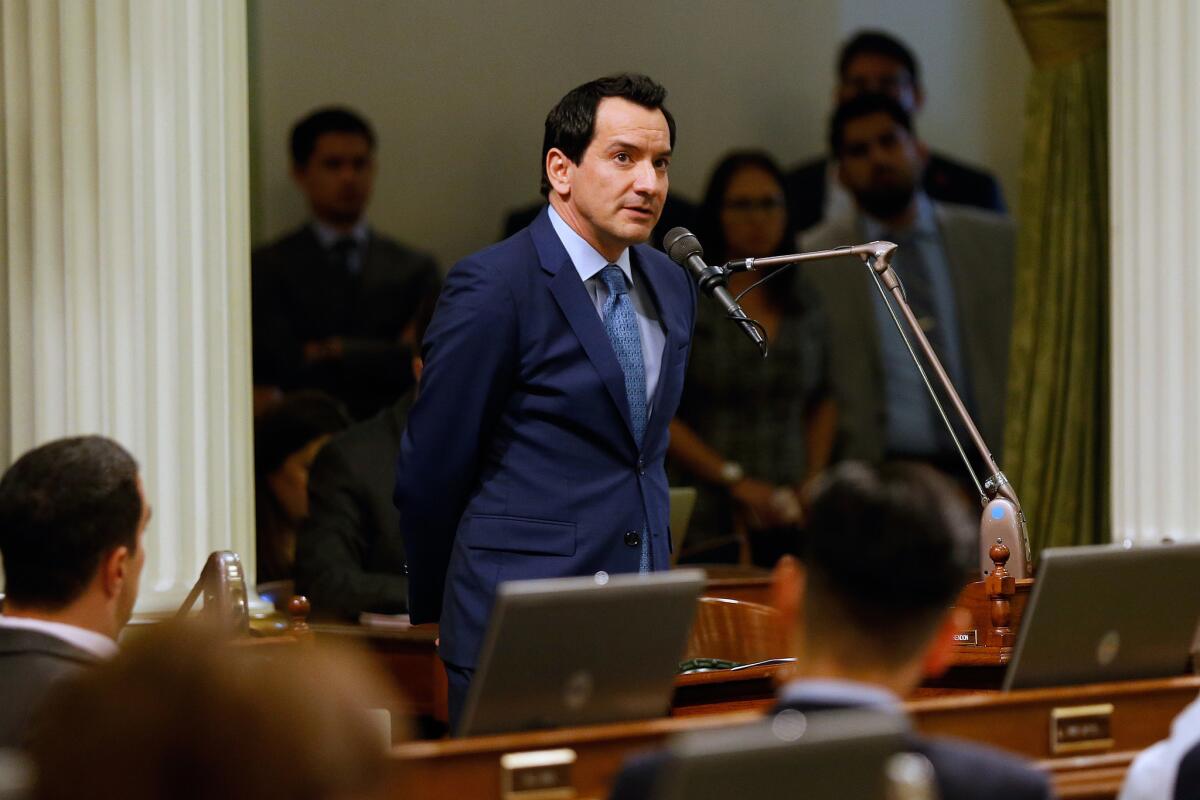Capitol Journal: In blocking a bad single-payer healthcare bill, Assembly Speaker Anthony Rendon was not âcowardlyâ â quite the opposite

Reporting from In Sacramento â California badly needs political heroes, and we just got one: Assembly Speaker Anthony Rendon.
âHeroicâ is not an adjective normally associated with a politician. But regardless of your politics, Rendon should be saluted.
The Paramount Democrat just quashed arguably the poorest excuse for major legislation one house has ever inflicted on another.
He personally sent packing a so-called single-payer universal healthcare bill that was virtually all fluff with little substance. Then he was viciously attacked by the nurses union that pushed the bill, playing bully politics.
The bill deserved what it got after being passed irresponsibly by Senate Democrats June 1 and sent to the unenthusiastic Assembly. Gov. Jerry Brown turned up his nose, too. âWhere do you get the extra money?â he asked sensibly.
A Senate Appropriations Committee analysis pegged the astronomical annual cost at $400 billion, more than twice the size of the state budget.
The billâs dreamers envisioned the state grabbing all the government and private money being spent on healthcare in California and using it to finance a single-payer program. That would include ending federal Medicare for seniors and pushing them into the new state-run system.
But even if all that were possible â and the Trump administration and Republican Congress implausibly allowed it â the state would still need to raise taxes by between $50 billion and $100 billion annually.
Yeah, right! That would be 10 to 20 times more than the $5.2-billion increase in gas taxes and vehicle fees the Legislature recently passed. And lawmakers are taking heavy political flak for that.
But let Rendon explain himself, because he nailed it. He has been a longtime supporter of single-payer, the speaker said in a statement, but this bill âwas sent to the Assembly woefully incomplete.â
âEven senators who voted for SB 562 noted there are potentially fatal flaws in the bill, including the fact it does not address many serious issues, such as financing, delivery of care, cost controls or the realities of needed action by the Trump administration and [California] voters,â he said.
Then he told the Senate, essentially, to do its job and write a real bill. This is only the first year of a two-year session, he noted, so it still has time âto fill the holes.â
Meanwhile, Rendon implied, this isnât the Assemblyâs responsibility.
âThe Senate was the body that raised expectations that single-payer could be created this year,â he told me. âSo itâs incumbent on them to follow through and fix the bill.
âThis bill wasnât even half-baked. It wasnât even a bill. It was an incomplete list of principles.â
A legislative leaderâs job also is to protect his party members from casting unnecessarily risky votes. Many Democrats would have lost politically regardless of how they sided on this pipe dream â angering taxpayers satisfied with their current insurance if they voted for the bill, or riling the potent California Nurses Assn. if they opposed it. Rendon spared them the anguish.
The nurses union went berserk. It accused Rendon of âdestroying the aspirations of millions of Californians for guaranteed healthcareâ and called it âa cowardly act.â
The Progressive Caucus of the California Democratic Party said it was âa clear example of moral cowardice.â And it accused legislators and the governor of being puppets of insurance and pharmaceutical interests opposed to single-payer.
The nurses brought in their own hero, Vermont Sen. Bernie Sanders, to proclaim he was âextremely disappointedâ in Rendonâs action.
That makes me disappointed in Sanders. He knows a lot about many things, but California state government is not one of them. He has no clue whether Sacramento has the competence or the money to take over all healthcare in California. It doesnât. His own state of Vermont tried to operate a single-payer system and failed.
Running for president, Sanders advocated âMedicare for all.â Good idea, but it needs to be done nationally. And it canât happen until Democrats again control the White House and Congress. Anyway, what the nurses are proposing isnât Medicare for all. In fact, it would eliminate Medicare in California.
What Sanders and the nurses should be focusing on is blocking Republican efforts in Congress to eliminate Obamacare and replace it with Trumpcare that would slash Medicaid for the poor.
The Brown administration estimated Wednesday that the U.S. Senate bill would ultimately cost California $30 billion annually in federal funds, forcing drastic reductions in Medi-Cal, our version of Medicaid. One-third of Californiaâs population, including half its children, are covered by Medi-Cal.
âThis bill takes a sledgehammer to the improvements we have made in our stateâs healthcare delivery system,â said Jennifer Kent, director of the state Department of Health Care Services.
âMy voice goes up two octaves when I talk about it,â U.S. Sen. Dianne Feinstein (D-Calif.) told reporters Tuesday during a joint conference call with Sen. Kamala Harris (D-Calif.) and Gov. Brown.
Meanwhile, other labor unions are asking the nurses to cool it on Rendon.
âThe attacks on him ⌠are unfair,â said Robbie Hunter, president of the State Building and Construction Trades Council of California. âTone down the rhetoric.â
Jim Araby, executive director of the United Food and Commercial Workers Western States Council, said: âSB 562 failed not because of Speaker Rendon, but because the proponents tried to ⌠pass an incomplete policy without doing the tough work to build a truly broad-based progressive coalition.â
Single-payer failed because one state canât handle it alone. Fortunately, one legislative leader had the common sense and courage to stop the foolishness.
Follow @LATimesSkelton on Twitter
ALSO
This California budget gimmick stinks
More to Read
Get the L.A. Times Politics newsletter
Deeply reported insights into legislation, politics and policy from Sacramento, Washington and beyond. In your inbox three times per week.
You may occasionally receive promotional content from the Los Angeles Times.










